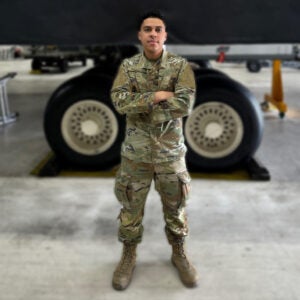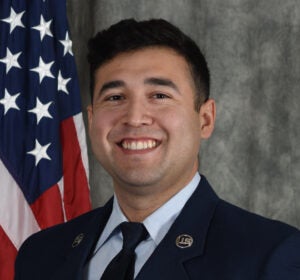
There are many reasons why people may enlist in the military: because they have a passion for their country or simply to find work.
“I decided to join the military to learn a trade and get my education benefits to finish my degree. My father-in-law and his dad are both Air Force Veterans, so they also were a big influence on my decision to enlist,” says Daniel Rivera, a Boise State cyber operations and resilience student.
Cyber operations and resilience student, Jeremiah Placencio, says the COVID-19 pandemic shut downs led him to the choice of staying home, not knowing when the pandemic will subside or enlisting.
Adrian Valesquez enlisted in the Air Force due to uncertainty about his plans after high school. Although there may be challenges that arise for those who choose to go to college while in the military, Boise State and the cyber operations and resilience program cater to military service members.
The balance to protect the country and attend university
Active military members face time constraint challenges. Being in the military is not as simple as clocking in to work, clocking out, then leaving to go home. Some members may be deployed to various parts of the world at any given moment. Some members may have frequent relocations. These experiences can make it difficult to attend a traditional university, with a set class schedule that requires classes on-campus. Active military members may also face excess stress and sometimes trauma. Adding academic stress on top of their work stressors may not lead them to be successful at work, school and life in general.
When working 12-hour shifts, Valesquez mentions, “Juggling military duties and school requires good time management skills, something I’ve had to learn along the way.”
Placencio states, “The current challenges I face as an active duty military member balancing my duties and academic studies is the unpredictability of conflict with our adversary nations…which would result in me deploying and secondly, the constant shift changes to accommodate the manning requirements. There have been times where I worked every shift during a one week period.”
The cyber operations and resilience program is tailored to military schedules and provides support systems that are important in fighting these obstacles.
A university that helps military members combat their academic challenges
Boise State is well known for offering benefits for active military members in order to help them overcome the challenges mentioned. The university offers online programs to help students be more flexible when taking classes and doing assignments. Eligible military students also get tuition assistance to help relieve financial barriers of attending university.
Placencio and Rivera recommend taking advantage of the Air University Associate to Baccalaureate Cooperative (AU-ABC) for those in the Air Force. The cyber operations and resilience program takes it a step further as they understand many military members and even veterans gravitate towards a career in cybersecurity.

The cyber operations and resilience program offers an analyst and threat intelligence certificate and master’s degree track for those interested in cyber warfare and national security. Placencio states, “The flexibility of an online university program has allowed me to bring my laptop anywhere and do school work.”
Rivera also praises the design of the cyber operations and resilience program courses. “This structure helps me stay on track without getting too complacent with the flexible online schedule.”
Why cybersecurity?
Cybersecurity continues to be an emerging field, especially for those in the military. With more national threats occurring in cyberspace, even the military has launched divisions of cybersecurity within their respective military branches.
This reason is why Valesquez decided to pursue a career in cybersecurity. “I’ve attended several briefings where Air Force leaders emphasized the importance of the cyber domain in future battles and the need for more personnel in this field. I plan on joining this career field soon in the Air Force.”
The jump to action response in the military can be experienced as well when working in cybersecurity. When a network has been breached, cybersecurity practitioners jump to action in order to remediate the threat and protect critical information. Air Force member and cyber operations and resilience student Rudy Martinez states, “Cyber is the new war zone. With my experience in security in the Air Force, I can take my experience online.”
The students also enjoy the courses provided as they find common ground with securing the nation and securing networks. “My favorite course so far has been Cyber Operations Networking. I have been motivated to apply what I have learned to configure a secure network at home and be able to teach others how to secure theirs,” Placencio says.

Meanwhile, Valesquez states, “Defensive Security is really interesting to me because it gives me a glimpse into how blue teams operate and use the tools that I regularly deploy in the range environment.”
Placencio says, “The Offensive Security course has been my favorite so far. This course really fueled my motivation and gave me a lot of insight into the ethical hacker field. It’s one of the reasons why I’m looking to transition into the Cyber Warfare career field in the Air Force!”
Martinez also states, “I enjoy Defensive Security. I get to protect people’s information and make them feel safe.”
Advice for active military members considering cybersecurity
When giving advice, some may say to just go for it and don’t hesitate. That may not be the case as juggling school and the military can be difficult.
Valesquez states, “Work on your time management skills. Balancing assignments within the flexibility of an online program alongside military commitments can be challenging. Also, discover what motivates you to maintain your focus on studies. Whether it’s a personal connection or a clear goal, having a reminder of why you embarked on this journey in the first place can help you stay on track!”
With Martinez, he mentions how a good support system is needed. With a family and children to take care of, he wouldn’t be able to have pursued a degree if it wasn’t for his wife, Amber.
For Rivera and Placencio, perseverance is key. Rivera says, “At times it has taken its toll (especially when I was Active Duty) and I’ve considered giving up. I took several breaks and transferred three times before I found this program. Now I’m so close to finishing my degree, and that alone is plenty of motivation to stay focused on my studies!”
Placencio also states, “I always look back at where I come from and I just go harder because I know where I want to go. I am on a constant quest for self progression and one of the demands of the Air Force if you want to succeed, is being a well-rounded Airman and fulfilling a part of that aspect is pursuing higher education which I am currently doing. It benefits me personally, educationally, and professionally.”
To learn more about the cyber operations and resilience program and how it can catapult careers for military members, click the button below.
By Ranier Lieberman